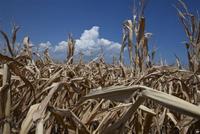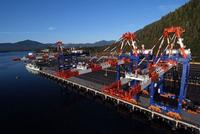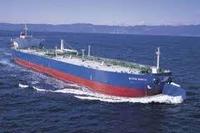-
Chronic 2000-4 U.S. drought, worst in 800 years, may be the "new normal"

The chronic drought that hit western North America from 2000 to 2004 left dying forests and depleted river basins in its wake and was the strongest in 800 years, scientists have concluded, but they say those conditions will become the “new normal” for most of the coming century
-
-
BAE Systems' defense technology to help Team GB win Olympic medals
Scientists and engineers from BAE Systems have been applying defense and security technology to help the British Modern Pentathlon team to evaluate their high-tech laser pistols, which were introduced at the beginning of the 2011 season, replacing traditional air pistols
-
-
U.S. agency critical of Canadian ports' security

The U.S. Federal Maritime Commission has issued a report criticizing Canadian sea ports for lax security. The commission reports singled out Prince Rupert port in British Columbia as an especially egregious case of insufficient security for U.S.-bound cargo
-
-
Critics charge satellite company Inmarsat violates Iran sanctions

A legal organizations specializing in fighting legal battles against terror sponsors – they say their goal is to bankrupt the terror groups and grind their activities to a halt, one lawsuit at a time – warned mobile satellite company Inmarsat PLC against providing prohibited guidance services to Iranian oil tankers and Iranian military vessels; in 2008, a United States Supreme Court ruling made the determination that individuals or companies that materially support terrorist organizations are liable for the murder and injuries they cause, according to Boim v. Holy Land Foundation
-
-
Food prices in U.S., world set to rise as a result of drought
The U.S. Midwest is suffering the worst drought since 1956, and a total of 1,369 counties in thirty-one states across the United States have been designated for disaster aid; the prolonged drought will lead to an increase in food prices in 2013 as animal feed costs increase
-
-
A device used to measure nuclear weapons effects is now used for rocket propulsion system
Can a device formerly used to test nuclear weapons effects find a new life in rocket propulsion research? That is the question in which researchers seek an answer; when assembled, the device will tip the scales at nearly fifty tons, and will be “one of the largest, most powerful pulse power systems in the academic world,” according to one researcher
-
-
Northrop Grumman delivers Nationwide AIS to Coast Guard
Northrop Grumman has delivered its Nationwide Automatic Identification System (AIS) to the Coast Guard; the system provides a more comprehensive view of vessels bound for and navigating within U.S. ports and waterways
-
-
Capturing CO2 directly from air is chemically, economically viable
With a series of papers published in chemistry and chemical engineering journals, researchers from the Georgia Institute of Technology have advanced the case for extracting carbon dioxide directly from the air using newly developed adsorbent materials
-
-
Pulling CO2 from air feasible, if still costly, way to curb global warming
Emerging techniques to pull carbon dioxide from the air and store it away to stabilize the climate may become increasingly important as the planet tips into a state of potentially dangerous warming; lower-cost technology is a stumbling block so far
-
-
New U.S. biodedfense R&D network launched
On Monday, Texas A&M System dedicated a new research center which is part of a national network of centers aiming to develop strategies and products to counter bioterrorism, chemical and radiological attacks on the United States, and better strategies to deal with pandemics; the network will have facilities in Texas, Maryland, and North Carolina; the Texas dedication is the culmination of a Manhattan Project-like program for biological countermeasures, launched in 2004 by the Department of Health and Human Services; the research network aims to develop “rapid, nimble and flexible approaches” to vaccine and therapy development, and train the next generation of professionals to sustain U.S. capabilities in these areas
-
-
You want to report a pothole? There’s an app for that

The city of Boston offers residents a new app – Street Bump – which will automatically report potholes they encounter; all the driver has to do is install the app and place the smartphone on the dashboard or in the cup holder; the app uses the phone’s motion detector and GPS locator to report potholes
-
-
Bill to tighten admission procedures to flight schools
A bill would require flight schools to check students, including U.S. citizens, against the terrorist watch list before they can be trained to fly aircraft of 12,500 pounds or more
-
-
Resolving mystery odor alarms
In the post-9/11, security-conscious era, unidentified odor often cause the precautionary evacuation of buildings, airport terminals, and more; a New Jersey company offers an educational video on the problem of mystery odors – and offers odor identification services to help identify and resolve mystery odor complaints
-
-
U.S. to send hand-launched UAVs to Kenya to help fight Somali al Shabaab
The United States will include hand-launched Raven UAV’s in the $41.4 million military aid package to Kenya; the package also includes trucks, communications gear, and rifles for Burundi, Djibouti, and Uganda; the military aid aims to help east African countries cope with the growing menace of al Shabaab, a Somali al Qaeda affiliate
-
-
New biometrics discipline -- foot biometrics – for security, disease detection
Identity science takes a giant, well, step forward with a new discipline in biometrics: foot biometrics; researchers at the new $1.5 million per year Pedo-Biometrics Research and Identity Automation Lab will test insole sensory system prototypes for a variety of identification uses, from security to detecting the onset of such diseases as diabetes and Parkinson’s
-